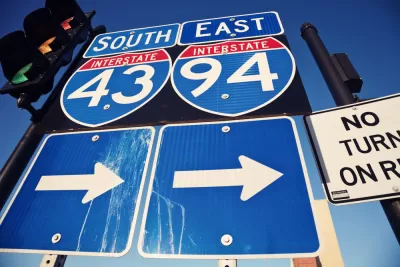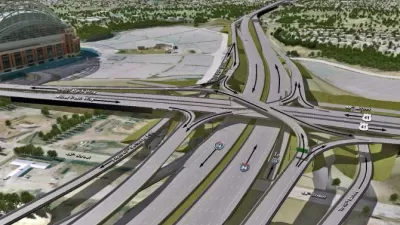The state’s department of transportation is moving forward with a proposal that will expand the freeway to eight lanes, rejecting a ‘Fix at Six’ plan that would have kept the existing six lanes.

After years of debate and delays, the Wisconsin Department of Transportation (WisDOT) has selected an eight-lane expansion plan for Interstate 94 in Milwaukee, despite calls from community activists and. environmental advocates to keep the road at six lanes and focus on safety improvements and maintenance instead. Jeramey Jannene describes the project for Urban Milwaukee.
The agency’s proposed design includes one new lane in each direction and a diverging diamond to replace the Stadium Interchange. “The diverging diamond concept, first unveiled in June, would involve the north-south roadways through the interchange running underneath the elevated east-west freeway.” As Jannene explains, “The design strategy results in fewer collision points than a traditional interchange because on-off ramp access doesn’t involve crossing lanes.”
Opponents of the expansion say the project ignores community concerns. Elizabeth Ward, director of Sierra Club Wisconsin Chapter, said “This proposal will increase water and climate pollution, health problems, racial disparities, and more. WisDOT needs to reconsider and move forward with a Fix at Six solution.”
The agency says it plans to invest $25 million in “transit solutions” to minimize disruption during construction. According to Jannene, “County officials have hoped to use some of the funding to support the development of the 27th Street bus rapid transit line. The project plan also calls for improved bicycle and pedestrian infrastructure near the freeway.”
Local council members Michael Murphy and Robert Bauman are among the plan’s detractors, saying, “To invest such a hefty sum of money into a project that will disrupt businesses and homeowners represents spending priorities that do not align with what people want, especially when traffic volume doesn’t justify the need for additional lanes.”
FULL STORY: State Picks I-94 Expansion Over ‘Fix at Six’ Proposal

Alabama: Trump Terminates Settlements for Black Communities Harmed By Raw Sewage
Trump deemed the landmark civil rights agreement “illegal DEI and environmental justice policy.”

Planetizen Federal Action Tracker
A weekly monitor of how Trump’s orders and actions are impacting planners and planning in America.

Why Should We Subsidize Public Transportation?
Many public transit agencies face financial stress due to rising costs, declining fare revenue, and declining subsidies. Transit advocates must provide a strong business case for increasing public transit funding.

Understanding Road Diets
An explainer from Momentum highlights the advantages of reducing vehicle lanes in favor of more bike, transit, and pedestrian infrastructure.

New California Law Regulates Warehouse Pollution
A new law tightens building and emissions regulations for large distribution warehouses to mitigate air pollution and traffic in surrounding communities.

Phoenix Announces Opening Date for Light Rail Extension
The South Central extension will connect South Phoenix to downtown and other major hubs starting on June 7.
Urban Design for Planners 1: Software Tools
This six-course series explores essential urban design concepts using open source software and equips planners with the tools they need to participate fully in the urban design process.
Planning for Universal Design
Learn the tools for implementing Universal Design in planning regulations.
Caltrans
Smith Gee Studio
Institute for Housing and Urban Development Studies (IHS)
City of Grandview
Harvard GSD Executive Education
Toledo-Lucas County Plan Commissions
Salt Lake City
NYU Wagner Graduate School of Public Service




























